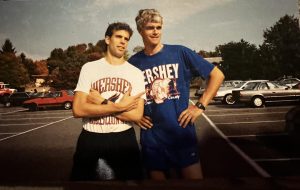Explainer: What is Cancel Culture?
March 30, 2021
Cancel culture. What is it? Where did the term come from? What does it mean now? Is it the end of nuance?
Cancel Culture, according to dictionary.com, “refers to the popular practice of withdrawing support for (canceling) public figures and companies after they have done or said something considered objectionable or offensive.”
Cancel Culture was first noticeably seen in 2014 when Myles McNutt, a television critic, tweeted, “It’s unfortunate how renew/cancel culture has made ‘not renewed early’ read as canceled — ‘wait and see until pilots come in’ is normal.” During this time the term was used but it was used differently by everyone.
More recently, during the Coronavirus pandemic, “cancel culture,” became far more widely known and used against a variety of people, primarily public figures. With everyone being home and online, people were looking for things to do, and aimed their energies at folks with real, perceived and even fabricated shortcomings.
Cancelling is largely driven by social media. The danger comes from anonymity. Everyone can be nearly anonymous online, hiding behind their screen. Thus nearly anyone can say anything they want against the people being “cancelled” without repercussions. By being so quick to judge others online reputations can be permanently tarnished, jobs lost, and more.
In the time between when the term was first coined and now, the definition has changed drastically. What first seemed to be a joke has turned into a serious action in which many businesses were ruined and many people lost their jobs.
“Canceling” someone is a pretty extreme way to teach a lesson. If an adult does something wrong and apologies for their actions or words, with sincerity, should they lose their job? Where is the chance for learning? For redemption? That’s a question that comes to mind when looking at some of the victims.
Chris Harrison, ABC’s host of the popular reality show “The Bachelor,” was recently impacted by “cancel culture.” He faced major backlash for speaking out about a current contestants’ racism allegations. A picture of contestant Rachael Kirkconnell at a 2018 fraternity party thrown by Kappa Alpha Order recently resurfaced.
The party was thrown at an old plantation near the college, Georgia College and State University, which Kirkconnell attended. Harrison did not defend Kirkconnell for her actions, but defended her against getting cancelled without being able to make a comment on the situation.
Harrison said,“I haven’t heard Rachael speak on this yet, and until I actually hear this woman have a chance to speak, who am I to say any of this?” He continued, “I saw a picture of her at a sorority party five years ago, and that’s it. I’m not defending Rachael —I just know that 50 million people did that in 2018. That was a type of party that a lot of people went to.”
Due to today’s racial tensions, Harrison’s comment seemed insensitive to the public because of the history of where the party was thrown dates back to slavery.
After facing backlash for the comment, Harrison apologized to the black community by stating in a social media post, “My words were harmful. I am listening, and I truly apologize for my ignorance and any pain it caused you.” In addition, Chris Harrison “stepped away” from the show after being a host for over 20 years.
Anyone can get cancelled, from a big business, to celebrities, to “everyday people,” and once you are cancelled it’s hard to come back from it.
Another example includes a man named Adam Smith. In 2012 Dan Cathy Chick-Fil-A’s president spoke out against gay marriage and received major backlash. Mike Huckabee, Arkansas governor at the time called for a Chick-Fil-A appreciation day in an attempt to bring light to this negative situation.
Protesters did the opposite and went through the drive through ordering only a free cup of water. Adam Smith, a successful business executive from Tucson Arizona, was one of these protestors, and filmed his experience and posted it on social media. Smith’s brother-in-law had faced many struggles while coming out, and Smith felt an obligation to protest.
Smith’s video showed him saying things to the worker such as “I don’t know how you live with yourself and work here.” The video went viral. And before Smith knew it he was a victim of cancel culture.
Cancel Culture has created a toxic environment on the internet and social media. We’ve lost the nuance of discussion in favor of the vehement partisanship of culture wars. There’s little room for learning, growth, and reconciliation for those that find themselves in the crosshairs of cancel culture. Without a change lives, jobs, and relationships will continue to be permanently tarnished.








